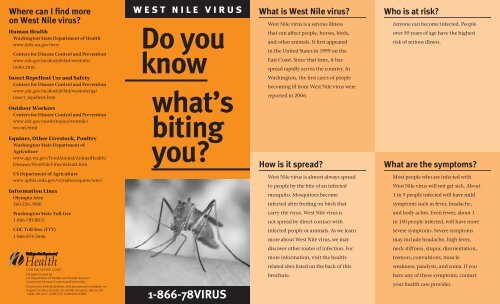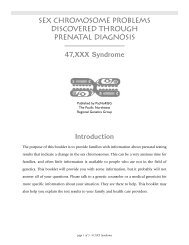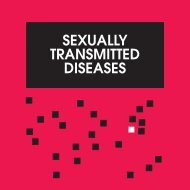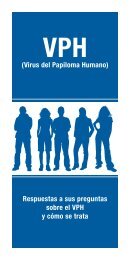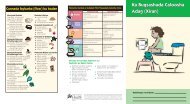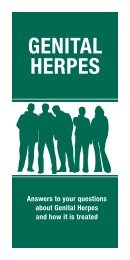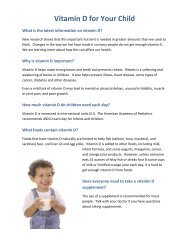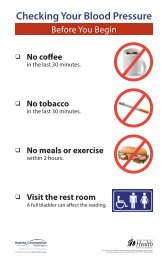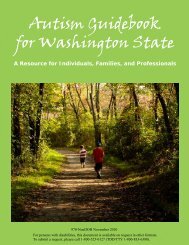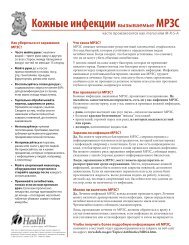West Nile Virus: Do You Know What's Biting You? - Brochure
West Nile Virus: Do You Know What's Biting You? - Brochure
West Nile Virus: Do You Know What's Biting You? - Brochure
You also want an ePaper? Increase the reach of your titles
YUMPU automatically turns print PDFs into web optimized ePapers that Google loves.
Where can I find more<br />
on <strong>West</strong> <strong>Nile</strong> virus?<br />
Human Health<br />
Washington State Department of Health<br />
www.doh.wa.gov/wnv<br />
Centers for Disease Control and Prevention<br />
www.cdc.gov/ncidod/dvbid/westnile/<br />
index.htm<br />
Insect Repellent Use and Safety<br />
Centers for Disease Control and Prevention<br />
www.cdc.gov/ncidod/dvbid/westnile/qa/<br />
insect_repellent.htm<br />
Outdoor Workers<br />
Centers for Disease Control and Prevention<br />
www.cdc.gov/niosh/topics/westnile/<br />
recout.html<br />
Equines, Other Livestock, Poultry<br />
Washington State Department of<br />
Agriculture<br />
www.agr.wa.gov/FoodAnimal/AnimalHealth/<br />
Diseases/<strong>West</strong><strong>Nile</strong><strong>Virus</strong>/default.htm<br />
US Department of Agriculture<br />
www.aphis.usda.gov/vs/nahss/equine/wnv/<br />
Information Lines<br />
Olympia Area<br />
360-236-3980<br />
Washington State Toll-free<br />
1-866-78VIRUS<br />
CDC Toll-free (TTY)<br />
1-866-874-2646<br />
DOH Pub 333-052 6/2007<br />
Partially funded by<br />
US Department of Health and Human Services<br />
Centers for Disease Control and Prevention<br />
For persons with disabilities, this document is available on<br />
request in other formats. To submit a request, please call<br />
1-800-525-0127 (TDD/TTY 1-800-833-6388).<br />
w e s t n i l e v i r u s<br />
<strong>Do</strong> you<br />
know<br />
what’s<br />
biting<br />
you?<br />
1-866-78VIRUS<br />
What is <strong>West</strong> <strong>Nile</strong> virus? Who is at risk?<br />
<strong>West</strong> <strong>Nile</strong> virus is a serious illness<br />
that can affect people, horses, birds,<br />
and other animals. It first appeared<br />
in the United States in 1999 on the<br />
East Coast. Since that time, it has<br />
spread rapidly across the country. In<br />
Washington, the first cases of people<br />
becoming ill from <strong>West</strong> <strong>Nile</strong> virus were<br />
reported in 2006.<br />
<strong>West</strong> <strong>Nile</strong> virus is almost always spread<br />
to people by the bite of an infected<br />
mosquito. Mosquitoes become<br />
infected after feeding on birds that<br />
carry the virus. <strong>West</strong> <strong>Nile</strong> virus is<br />
not spread by direct contact with<br />
infected people or animals. As we learn<br />
more about <strong>West</strong> <strong>Nile</strong> virus, we may<br />
discover other routes of infection. For<br />
more information, visit the health-<br />
related sites listed on the back of this<br />
brochure.<br />
Anyone can become infected. People<br />
over 50 years of age have the highest<br />
risk of serious illness.<br />
How is it spread? What are the symptoms?<br />
Most people who are infected with<br />
<strong>West</strong> <strong>Nile</strong> virus will not get sick. About<br />
1 in 5 people infected will have mild<br />
symptoms such as fever, headache,<br />
and body aches. Even fewer, about 1<br />
in 150 people infected, will have more<br />
severe symptoms. Severe symptoms<br />
may include headache, high fever,<br />
neck stiffness, stupor, disorientation,<br />
tremors, convulsions, muscle<br />
weakness, paralysis, and coma. If you<br />
have any of these symptoms, contact<br />
your health care provider.
What are public health<br />
agencies doing in<br />
Washington state?<br />
State and local health departments:<br />
• Monitor for <strong>West</strong> <strong>Nile</strong> virus by<br />
identifying and testing mosquitoes.<br />
• Track the number of dead bird<br />
reports.<br />
• Collect specific species of dead birds<br />
for testing.<br />
• Notify health care providers to look<br />
for and report symptoms in patients.<br />
• Notify veterinarians to look for and<br />
report horses and other animals with<br />
signs of <strong>West</strong> <strong>Nile</strong> virus.<br />
• Distribute information on the virus<br />
and how to control mosquitoes.<br />
These efforts are designed to identify<br />
<strong>West</strong> <strong>Nile</strong> virus before an outbreak.<br />
Public health officials will alert<br />
communities about measures that they<br />
can take to control <strong>West</strong> <strong>Nile</strong> virus.<br />
For the latest on <strong>West</strong> <strong>Nile</strong><br />
virus in Washington, visit<br />
www.doh.wa.gov/wnv<br />
How can I protect my family?<br />
There is no human vaccine for <strong>West</strong> <strong>Nile</strong> virus. The best way to protect yourself is to avoid<br />
mosquitoes. Take these steps to avoid mosquito bites and reduce the places where mosquitoes<br />
live and breed around your home.<br />
Avoid Mosquito Bites<br />
Make sure windows and doors are<br />
“bug tight.” Repair or replace screens.<br />
Stay indoors at dawn and dusk, if<br />
possible, when mosquitoes are most<br />
active.<br />
Wear a long sleeve shirt, long pants,<br />
and a hat when going into mosquito-<br />
infested areas, such as wetlands or<br />
woods.<br />
Use mosquito repellent when<br />
necessary. Read the label and carefully<br />
follow the instructions. Take special<br />
care when using repellent on children.<br />
Can <strong>West</strong> <strong>Nile</strong> virus affect my pets?<br />
<strong>West</strong> <strong>Nile</strong> virus can cause serious illness in horses and donkeys. Though most horses do<br />
not get sick, about 1 in 3 horses that do get sick will die. To protect your horses ask your<br />
veterinarian about the <strong>West</strong> <strong>Nile</strong> virus vaccine for horses. Follow the same steps as above to<br />
reduce places where mosquitoes live and breed near horse pastures and barns. It is rare that<br />
<strong>West</strong> <strong>Nile</strong> virus will cause illness in dogs, cats, and other animals.<br />
<strong>Do</strong>n’t Give Mosquitoes a Home<br />
Empty anything that holds standing<br />
water—old tires, buckets, plastic<br />
covers, flowerpots, and toys.<br />
Change the water in your birdbaths,<br />
fountains, wading pools, and animal<br />
troughs at least twice a week.<br />
Recycle unused containers that can<br />
collect water—bottles, cans, and<br />
buckets.<br />
Make sure roof gutters drain properly;<br />
and clean clogged gutters in the spring<br />
and fall.<br />
Fix leaky outdoor faucets and<br />
sprinklers.<br />
What should I do if I<br />
find a dead bird?<br />
<strong>West</strong> <strong>Nile</strong> virus infects certain wild<br />
birds. Crows, jays, ravens, and magpies<br />
tend to become sick and die from<br />
infection. Increasing numbers of dead<br />
birds may be an indication of <strong>West</strong><br />
<strong>Nile</strong> virus in your community. <strong>You</strong> can<br />
help by reporting dead crows and other<br />
birds to your local health department,<br />
environmental health program. Look<br />
in the phone book under County<br />
Government–Health. Certain dead<br />
birds will be tested to monitor for <strong>West</strong><br />
<strong>Nile</strong> virus.<br />
While there is no current evidence<br />
that you can get <strong>West</strong> <strong>Nile</strong> virus from<br />
handling dead birds, avoid bare-<br />
handed contact. Use gloves or double<br />
plastic bags to place the carcass in a<br />
garbage can.<br />
What is an effective<br />
mosquito repellent?<br />
Repellents that contain DEET,<br />
Picaridin, or oil of lemon eucalyptus<br />
are the most effective. Products come<br />
in lotions, creams, gels, sprays, and<br />
towelettes. With any of these products,<br />
read the entire label carefully before<br />
using and follow the directions. <strong>Do</strong> not<br />
over use repellents.
Dear Colleague,<br />
The Washington State Department of Health (DOH) is pleased to provide cameraready<br />
art for printing this educational material. To ensure that the original quality of<br />
the piece is maintained, please read and follow the instructions below and the<br />
specifications included for professional printing.<br />
• Use the latest version. DOH materials are developed using the most current<br />
information available, are checked for clinical accuracy, and are field tested<br />
with the intended audience to ensure they are clear and readable. DOH<br />
programs make periodic revisions to educational materials, so please check<br />
this web site to be sure you have the latest version. DOH assumes no<br />
responsibility for the use of this material or for any errors or omissions.<br />
• <strong>Do</strong> not alter. We are providing this artwork with the understanding that it<br />
will be printed without alterations and copies will be free to the public. <strong>Do</strong><br />
not edit the text or use illustrations or photographs for other purposes<br />
without first contacting us. Please do not alter or remove the DOH logo,<br />
publication number or revision date. If you want to use a part of this<br />
publication for other purposes, contact the Office of Health Promotion first.<br />
• For quality reproduction: Low resolution PDF files are intended for black<br />
and white or color desktop printers. They work best if you are making only<br />
one or two copies. High resolution PDF files are intended for reproducing<br />
large quantities and are set up for use by professional offset print shops. The<br />
high resolution files also include detailed printing specifications. Please match<br />
them as closely as possible and insist on the best possible quality for all<br />
reproductions.<br />
If you have questions, contact:<br />
Office of Health Promotion<br />
P.O. Box 47833 Olympia, WA 98504-7833<br />
(360) 236-3736<br />
Sincerely,<br />
Health Education Resource Exchange Web Team


